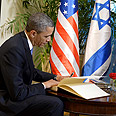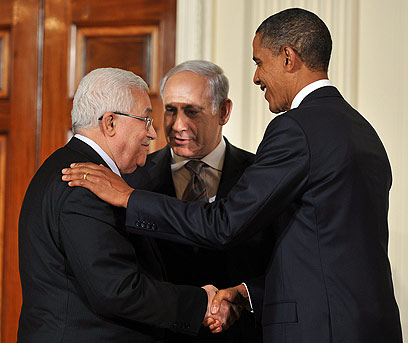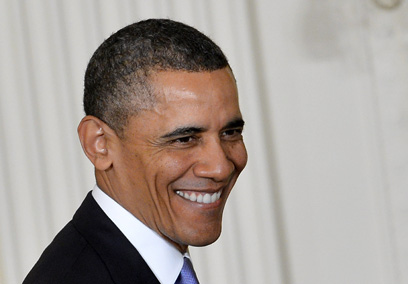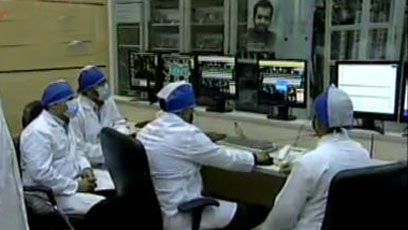
Friction behind the smiles
Analysis: Obama's visit will likely be hailed as a success, but disagreements on Iran nuke program, stalled peace process remain
Officials from Obama's inner circle are trying to lower the expectations of the Israeli and American publics. The visit's value lies in the fact that it is taking place, they say, to avoid any possibility that it will be perceived as a failure.
But they also realize this is a good time to do business with the Israeli government. Netanyahu is no longer "King Bibi" after the defeat in the elections and the humiliating coalition talks, while Obama is relatively free of pressures in his second and final term as president. Therefore, it is clear that Netanyahu will go to great lengths to erase the disputes of the past and provide a new boost for strategic cooperation.
On Monday we specified America's short-term goals in the Middle East: To ensure a constant supply of energy to the global market; stop the killing of civilians; prevent a regional nuclear arms race and the collapse of the Non-Proliferation Treaty; and to prevent the spread of radical Islam so it does not pose a real threat to Israel and the moderate, pro-Western Islamic regimes in the region. Another important goal is to preserve Washington's influence in the region in the face of Russia's attempts to diminish it.
Washington is well-aware it cannot take on such a task alone during this bloody "medieval" period in the region. The solution: Creating an axis of stable Sunni countries to counter the Iran-led radical Shiite axis, which is seeking hegemony in the Middle East. The main candidates to join this pro-Western axis are the Gulf States, Turkey, Jordan, Egypt and perhaps Algeria and Morocco as well. These countries will assist each other in times of crisis, destroy the murderous Global Jihad groups, and coordinate their moves. This is already happening in Syria.
Washington wants Israel to be a quiet partner in this axis so that the Jewish state will be able to cooperate with its neighbors over the table, and mainly under it. This could be beneficial in the event that the US or Israel – or both countries - attack Iran. For the sake of this cooperation Obama will likely ask Netanyahu to show restraint and calm in the Palestinian arena and ask Abbas to refrain from attempting any empty diplomatic provocations that will anger Israel and foment unrest in the territories.
The US also wants Israel to initiate goodwill gestures to the Arabs and the Palestinian Authority to make it easier for the PA to join the pro-Western Muslim axis. One such gesture would be declaring that Israel accepts the Arab peace initiative. For this same reason Obama will also ask Israel's leaders to swallow their pride and end the conflict with Turkey. This strategic American maneuver is already showing results on the ground. There is increased cooperation between the US and regional players to prevent the leakage of Syrian chemical weapons to hostile elements. Israel and the US are also in agreement regarding the need to prevent al-Qaeda from take control over Syria.
This is the essence of Obama's "great strategy," which he will try to promote during his visit. The practical aspect of the visit will focus on three main issues: The Iranian nuclear program, resuming the efforts to reach an Israeli-Palestinian agreement and dealing with the threats from the north (Syria and Lebanon).

Not enthusiastic. Obama with Abbas and Bibi (Archive photo: AFP)
With regards to Iran, there are fewer disagreements between Israel and the Obama administration. There is no argument over the intelligence information indicating that Iran's nuclear program is at an advanced stage. The sides also agree in principle on the need to exhaust the non-military means and that the West should have a credible military option that will be activated should Iran cross the red line.
The US and Israel are still at odds over the definition of this red line. The Americans speak of "preventing Iran from developing nuclear weapons," while Israel stresses the need to make certain Iran does not obtain the "capabilities" that would allow it to produce a nuclear bomb. In other words, the US is talking about blocking Iran with a military operation just before it begins the actual production of a nuclear warhead - if there is no other choice. Israel is demanding that Iran be stopped much earlier, before it accumulates 240 kilograms of uranium enriched to a 20% purity level and turns into a country on the brink of nuclear weapons capability.
Israel claims that an Iran "on the brink" would have the same effect on the region as a nuclear Iran would have. The Americans do not accept this argument, although they have recently lowered their red line and brought it closer to the Israeli one. In an interview with Channel 2 Obama hinted he would not allow Iran to obtain nuclear capabilities and that if Khamenei orders his people to produce such a bomb the US would act. But there is still a major difference between the pace in which the Israeli clock is ticking and the pace in which the American clock is ticking.

Relatively free of pressures. Obama (Photo: AFP)
The Americans argue that more than a year will pass before Iran reaches the point where it is has the ability to produce a nuclear weapon within weeks of Khamenei's order, meaning there is still time to apply pressure on the ayatollahs through sanctions, diplomatic negotiations and perhaps even covert operations meant to disrupt the nuclear program. In case these means are not able to stop the Iranian nuclear program by the summer of 2014, more or less, the US will have to prepare for a military operation. Israel claims a decision must be made this coming summer, or in the autumn at the latest – when Iran will have enough 20%-enriched uranium to produce one nuclear warhead.
Netanyahu and his associates will claim the Iranians will not suspend uranium enrichment unless they will be convinced that the US has a plan for an attack on its nuclear its nuclear facilities. Obama and his aides will justifiably say that the Pentagon has already prepared a detailed and efficient plan for an attack in Iran and that former Defense Minister Barak and IDF chief Gantz are more or less familiar with it.

Where is the red line? Iranian nuclear plant
But, the Israelis will say, the Iranians do not believe you and believe the talk of a military option is a bluff, particularly in light of the appointments of John Kerry as secretary of state and Chuck Hagel as defense secretary. Both men are opposed to a military strike on Iran. The Iranians also noticed, the Israelis will say, that the US pulled one of its aircraft carriers out of the Persian Gulf and that it is cutting its defense budget. You must do something to show the Iranians that you are serious, otherwise there is no chance Iran will become more flexible after the June elections. The Americans may act in this direction after Obama's visit here.
Regarding the Iranian issue, the Americans will tell Israel: Don't surprise us with a go-it-alone strike, and show restraint when it comes to making statements for the press. Whenever an Israeli politician or military official threatens that Israel will attack, the Iranians are not deterred but global oil prices skyrocket. The Iranians profit from this and the European economies sustain another blow.
As for the stalled peace process, it is safe to assume that Obama is not overly enthusiastic about mediating between Abbas and Netanyahu. Obama will most likely try to find out if it is possible to jumpstart the negotiations and whether such talks can yield results. Netanyahu and Ya'alon will suggest that the US try to broker an interim agreement that will allow progress toward a permanent agreement in the future, when both sides will be prepared to make the necessary compromises. Chances are that Abbas will continue to insist on a settlement construction freeze as a precondition for resuming negotiations. Considering the composition of Israel's new agreement, Netanyahu and his ministers will not accept this demand. However, Yair Lapid and Tzipi Livni may want to advanced Dan Meridor's initiative, which calls for a construction freeze outside the settlement blocs, as a gesture to the American president.
In any case, if Obama sees that there is no way of resuming effective negotiations, he will ask Israel to make gestures and take measures (regarding the Palestinian prisoners for example) to calm the situation on the ground and avoid steps that will ignite the area. For now, the US will not try to force Israel into another round of talks with the PA, but in the future, say six months from now, Washington may introduce a proposal for an agreement and try to force both sides to accept it.
Regarding the threats from the north, the US recognizes Israel's right to thwart terror activities along its borders with Syrian and Lebanon and respond harshly to any Hezbollah rocket attack on Israeli population centers.
Obama's first visit to the Holy Land as president will most likely be hailed as a great success by the media, if only because Obama, Netanyahu and to some extent Abbas have an interest in using each other to cover up the failures and political humiliations they have recently suffered in the domestic arena. But this visit also has a very important practical aspect to it: The American president is no longer playing the role of Uncle Sam who offers presents to children; this time he will demand that Israel and the Palestinians help him implement his government's new strategy in the Middle East.










